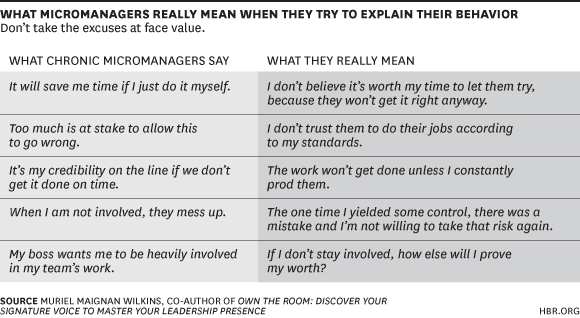… Stop Micromanaging!
Without a doubt, no one likes to be micromanaged ……………… and especially not those who actually micromanage!
But micromanagers themselves are seldom aware of their ‘controlling’ way – they have developed habits over the years – bad habits – which are demotivating for their employees and which prevent them building relationships of trust.

Additionally, micromanaging causes an inordinate build-up of stress as the micromanager:
- intensely scrutinizes each and every task and activity undertaken by their employees;
- believes their way of doing something, is the only way to do it;
- doesn’t trust their employees enough to complete their tasks, manage their time and their movements within the workplace;
- cannot manage their own time to work ‘ON’ the business and not ‘in’ it;
- fails to understand their behaviours are damaging to their people, their customers and to the organisation.
If you think perhaps you could be subconsciously micromanaging based on the indicators above, have a look at the fantastic table below from Harvard Business Review (HBR) and evaluate your own management style against this.

You Can Stop Micromanaging By Mastering The Art Of DELEGATION!
If you want an empowered, productive and interdependent team and working environment – and if you want to become more productive and a more successful manager, stop rationalizing why you micromanage and learn how to delegate!
Delegation is often dreaded by managers, but it is both an essential and an unavoidable skill which will allow you to learn to trust your employees, develop their capabilities and remove yourself from the ‘daily doing’ to work on the future direction of your business or department.
Delegating tasks the right way will help your employees understand your expectations and develop their own way to get work done quickly. What you need to remember here is that just because your employees might do a task differently to you, it is not wrong – it is just different!
Delegating effectively is a critical part of you being a successful manager, knowing you achieve your results through your people. Focus on the bigger picture, build trust with your employees and motivate them by delegating to them.
I hope these guidelines on how to delegate will help you get started……
1. Explain Why You’re Delegating
You don’t want your employees to think you’re taking advantage of them or passing them work that you don’t want to do. Instead, explain to your employees:
- why you have chosen to delegate to them;
- how this is part of their professional development;
- the context of the task you have given them – where it fits in the overall scheme of things and why it is important.
Help them develop a positive mindset by:
- clearly defining your expectations in terms of the final outputs;
- explaining how you value their contribution;
- ensuring this delegated task aligns with their capabilities.
2. Manage Your Own Fear
Quite often managers hesitate to delegate important tasks because that means giving control of the outputs to someone else. This is a perfectly normal concern, but make sure it is not an indication of your mistrust in their capabilities.
You must trust those you are delegating to, to take on more responsibility. This is part of your responsibility to develop your employees who may become new managers and leaders within the organisation.
3. Coach Your Employees
If those employees you are delegating to are fearful of taking on work that is related to a more senior role than their own you need to support them through coaching.
By applying your key coaching skills, you need to develop your employees to progress in their career. Managers who can coach and delegate efficiently have developed strong relationships of trust with their employees, which in turn increases their productivity, their engagement, and their overall success.
4. Be Available
Once you have delegated the task, it is important that you are available throughout the entire life-cycle of a delegated assignment, especially if this type of work is new to your employees, or there are unusual circumstances surrounding it.
You must show your willingness to help with any questions or problems that arise, while at the same time, making sure you do not micro-manage their work.
Delegation is an important tool for modern managers, and as the world of work becomes more complex, it’s important to develop this crucial skill and build a collaborative and developmental culture in your organization.
Did you find this helpful?
Let me know what you think about this post in the comments box below and also if there are any specific topics you would like me to cover in the future for you!


